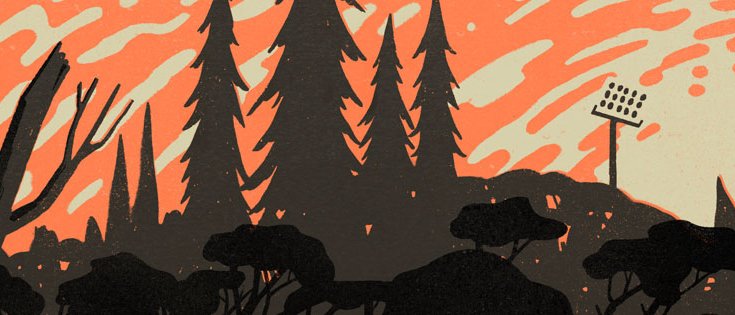My grandfather died while causing a seven-hour delay of game, which, according to the other grandpas, is how they all want to go now.
It was the first game of the new year. The river had groaned to life, and the marriageable men from Three Mile had come down the valley with bats and nets. We fed them cutthroats and buttonquail, and they flirted with everyone.
After a suitable while, the men from Three Mile began to pet their bellies and complain that we might win the game through hospitality, which gratified and provoked us greatly. Assertions were made on both sides. Napkins were thrown. And when the young men took to the field, no one was laughing.
The custom in our village, as you may know, is that before the first frame, one of the old men may stand up and challenge the slinger. Usually, it was sage Wooly who did the honours, using his time with the bat to hold forth on tradition and respect. Or funny old Bobo, who always turned his four swings into a real show. He had stunts and gags, Bobo. But neither Bobo nor Wooly had survived the cold this year, and when the slinger turned to the grandpas sitting on their log, they all looked at the ground. We felt their loss. We felt the sun on our skin. The grass grew for a while.
Then my own grandfather, a pyjama-eyed man who dozed through birthday parties, rose to his feet and without a word propelled himself toward the batter’s line. The crowd, we cheered. And then, because my grandfather was still not halfway across the field, we cheered again, more slowly.
The slinger slung—a respectful throw, without venom or pity. We did not see my grandfather swing. Our eyes were set on the wrong speed. But we heard the twock. We saw the ball arc high over the slinger’s head. We felt our lungs fill with cool spring air and then empty out into a dumb shriek. My grandfather watched the ball plunk into the tall kettlegrass, then straightened himself up, raised the bat, and waited.
The slinger fired again, a serious go. My grandfather struck with a ferocity we did not understand. He was a shock of movement. Like an arthritic old rooster who suddenly takes flight for two, three, four seconds and then lands in his tracks, unruffled.
Again and again, he sent the young men scrambling for the ball. With every smack of the bat, we became more ecstatic. We yelled into each other’s faces. The valley filled with the sounds of our joy.
After an hour, something like awe came over the crowd. Parents held their children up over their heads and said, Do you see that man? That’s the man who sucked seventeen stingers out of your tiny foot when you stepped on a darters’ nest. That’s the man who figured out how to cook canker root that winter we were all hungry. That’s the man who lowered himself into the forbidden well and slept there for three nights until it was unhaunted.
And the children leaned forward and watched with narrowed eyes, because they could feel themselves becoming part of a story.
At one point, my grandfather laid down on the ground and appeared to take a nap. He had smucked the ball into the brambles, and the young men were struggling to get it out. We thought this might be it. We spoke quietly, to not wake the old man, and whispered to each other about how long he had gone and what a marvel. But when the ball was freed, my grandfather got to his feet and hit the thing with even more conviction.
An anxiety seeped through the crowd. It was occurring to us that we might need the miracle to end. Eventually, dinner would have to be started. Crops would need to go in. The children would want raising.
Did we want to see this old man beaten? To see him forced from the field by the too-handsome slinger? To see him flail toothlessly at empty air?
No. We wanted him to hit this ball, and the ball after that, and to go on hitting them forever. Still, we felt implicated in a terrible proposition.
The day wore itself out. The slinger wore a pinched, desperate look, and threw badly. Even the gunk balls, my grandfather hit. We watched every swing with hope and dread, until hope and dread ate each other.
Only the old men cheered now.
The second time my grandfather laid down, he didn’t get up. We began to chant his name, his given name, which we had not felt on our lips in many years. Children ran onto the field with fruit for the exhausted old man, and knelt and pressed it against his mouth. Then the children began to cry and there was some confusion, though we all knew the fact of it.
The grandpas pushed through the crowd and surrounded the body. They lifted my grandfather onto their round shoulders and carried him as a hero into the dark woods. We were all of us on our feet now. For a long time, we stood, saying nothing. We listened to the river arriving and leaving.
After a while, of course, the young men were obliged to start the game, but no one stayed to watch. We went to our homes and spoke tenderly to one another and sang songs that our great-grandmothers had sung, and held each other through the night.
This appeared in the March 2013 issue.




